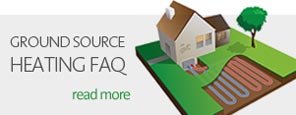Heat your home with energy absorbed from the air around you.
Air source heat pumps absorb heat from the outside air. This heat can then be used to heat radiators, underfloor heating systems, or warm air convectors and hot water in your home.
An air source heat pump extracts heat from the outside air in the same way that a fridge extracts heat from its inside. It can get heat from the air even when the temperature is as low as -15° C. Heat pumps have some impact on the environment as they need electricity to run, but the heat they extract from the ground, air, or water is constantly being renewed naturally.
The benefits of air source heat pumps
Air source heat pumps (also known as ASHPs):
- could lower your fuel bills, especially if you are replacing conventional electric heating
- could provide you with an income through the government’s Renewable Heat Incentive (RHI)
- could lower your home’s carbon emissions, depending on which fuel you are replacing
- don’t need fuel deliveries
- can heat your home and provide and hot water
- need little maintenance – they’re called ‘fit and forget’ technology
- can be easier to install than a ground source heat pump, though efficiencies may be lower.
Unlike gas and oil boilers, heat pumps deliver heat at lower temperatures over much longer periods. During the winter they may need to be on constantly to heat your home efficiently. You will also notice that radiators won’t feel as hot to the touch as they might do when you are using a gas or oil boiler.
How do air source heat pumps work?
Heat from the air is absorbed at low temperature into a fluid. This fluid then passes through a compressor where its temperature is increased, and transfers its higher temperature heat to the heating and hot water circuits of the house. There are two main types of air source heat pump system:
An air-to-water system distributes heat via your wet central heating system. Heat pumps work much more efficiently at a lower temperature than a standard boiler system would. So they are more suitable for underfloor heating systems or larger radiators, which give out heat at lower temperatures over longer periods of time.
An air-to-air system produces warm air which is circulated by fans to heat your home. They are unlikely to provide you with hot water as well.
Is an air source heat pump suitable for me?
To tell if an air source heat pump is right for you, there are a few key questions to consider:
- Do you have somewhere to put it? You’ll need a place outside your home where a unit can be fitted to a wall or placed on the ground. It will need plenty of space around it to get a good flow of air. A sunny wall is ideal.
- Is your home well insulated? Since air source heat pumps work best when producing heat at a lower temperature than traditional boilers, it’s essential that your home is insulated and draught-proofed well for the heating system to be effective.
- What fuel will you be replacing? The system will pay for itself much more quickly if it’s replacing an electricity or coal heating system. Heat pumps may not be the best option for homes using mains gas.
- What type of heating system will you use? Air source heat pumps can perform better with underfloor heating systems or warm air heating than with radiator-based systems because of the lower water temperatures required.
- Is the system intended for a new development? Combining the installation with other building work can reduce the cost of installing the system.
You may also want to consider ground source heat pumps, which use pipes buried in the garden to extract heat from the ground. Call us today for a no-obligation chat about your requirements.
Interested in Air Source Heating?
If you are interested in finding out more about getting Air Source Heating for your property, you can call us on 015242 62330 or use one of the option below.













